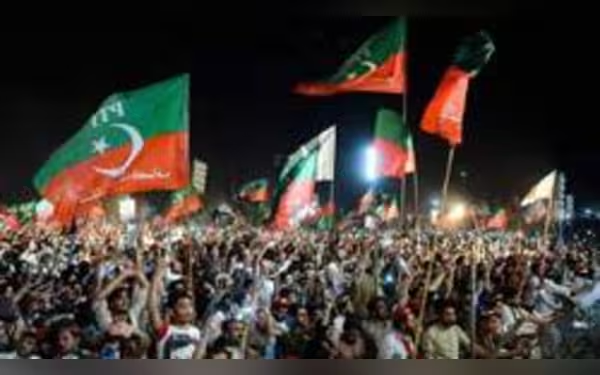Saturday, November 16, 2024 05:45 PM
PTI Considers Postponing Protest Pending Imran Khan Meeting
- PTI may call off protest if meeting with Imran Khan occurs.
- Government vows to prevent disruptions during SCO summit.
- Tensions rise as PTI accuses government of conspiracy.
 Image Credits: nation_pk
Image Credits: nation_pkPTI considers postponing protest if Imran Khan meeting is arranged, amid rising political tensions and government security measures for SCO summit.
In recent developments, the Pakistan Tehreek-e-Insaf (PTI) party has expressed its willingness to postpone a planned protest scheduled for October 15. This decision hinges on the possibility of a meeting with the party's founder and former Prime Minister, Imran Khan. The PTI's core committee, led by Barrister Salman Akram Raja, convened to discuss the situation and reached a consensus that if a meeting with Khan can be arranged by October 14, the protest will be called off.
According to sources within the party, the leadership has indicated that they are open to postponing the protest if meetings with doctors, lawyers, or any other party leaders can be facilitated. However, the mood is tense, as the sources also warned that if the meeting does not materialize, the PTI will proceed with a strong protest on the scheduled date.
During the core committee meeting, there was a division of opinion among party members. Some suggested that the protest should be delayed due to the upcoming Shanghai Cooperation Organization (SCO) summit, which is expected to attract significant international attention. Others, including prominent figures like Shahbaz Gill and former Chief Minister of Gilgit-Baltistan, Khalid Khurshid, opposed this notion, emphasizing the importance of standing firm against what they perceive as government oppression.
The PTI leadership has characterized the government's ban on meetings with Imran Khan as a "calculated conspiracy" aimed at undermining the party's influence. Senior leader Sheikh Waqas Akram has publicly urged the government to allow a meeting with Khan, warning that failure to do so would result in protests at D-Chowk, a prominent location in Islamabad.
In response to the PTI's planned protest, the federal government has pledged to deploy its "full force" to prevent any disruptions during the SCO summit. Preparations are in full swing to host approximately 900 delegates, with the ruling coalition mobilizing over 10,000 police and paramilitary personnel to ensure their safety. Coalition ministers have been vocal in their criticism of the PTI, accusing the party of attempting to disrupt the summit and even calling for judicial intervention.
This situation highlights the ongoing political tensions in Pakistan, where the actions of the PTI and the government's responses are closely intertwined. As the date of the protest approaches, many are left wondering how this will impact not only the political landscape but also the international perception of Pakistan during a significant diplomatic event. The coming days will be crucial in determining whether dialogue can prevail over confrontation, and whether the PTI's protest will indeed take place or be postponed in the interest of national unity.













